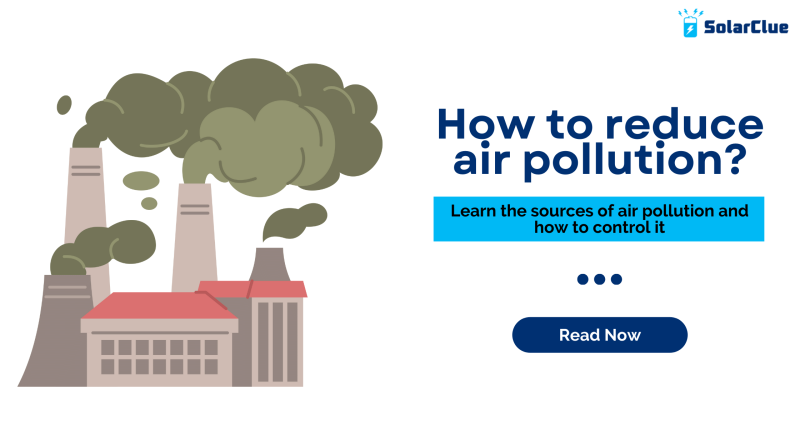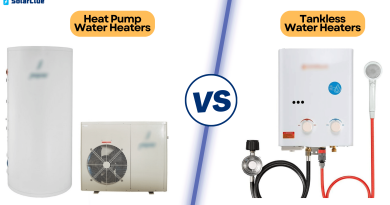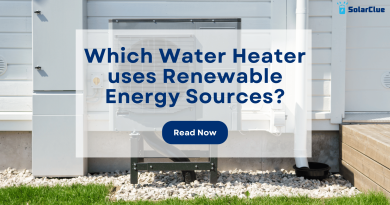How to reduce air pollution?
Air pollution is a major environmental concern that affects our health, quality of life, and the planet we live on. So now the question is how to reduce air pollution? It is high time that we take steps towards controlling air pollution. This is the only way to a sustainable future.
In this blog, we will discuss in detail about air pollution, and what is the way we can contribute towards reducing pollution. Let’s get started.
Table of Contents
What do you mean by air pollution?
Air pollution refers to the presence of harmful substances in the atmosphere, such as particulate matter, nitrogen oxides, sulfur dioxide, and carbon monoxide. These pollutants can come from various sources and have serious consequences for human health, including respiratory problems, heart disease, and even premature death. Furthermore, air pollution contributes to global warming, acid rain, and the depletion of the ozone layer, making it an urgent issue to address.
What are the sources of air pollution?
To know how to avoid air pollution, you must understand what causes it. There are many sources, some of them include:
- Vehicle emissions: Combustion of fossil fuels in automobiles, trucks, and other modes of transportation releases harmful gases into the air.
- Industrial activities: Manufacturing processes, power plants, and other industrial facilities can emit pollutants like sulfur dioxide, nitrogen oxides, and particulate matter.
- Residential and commercial sources: Heating and cooling systems, as well as the burning of fossil fuels for cooking and heating, contribute to air pollution.
- Agricultural practices: Certain farming methods, such as the use of fertilizers and pesticides, can release ammonia and other pollutants into the air.
- Natural sources: Volcanic eruptions, dust storms, and wildfires can also contribute to air pollution, although their impact is generally less significant than human-made sources.
How can we reduce air pollution?

To reduce pollution, Governments and industries must take steps. Like Governments can make policies to mitigate air pollution. But do you ever wonder what measures we can take to reduce air pollution in India?
In India, every household use electric appliances like geyser, refrigerator to meet the day-to-day needs. But these consume a lot of electricity. And this is not got, as electricity is produced by burning fossil fuels like coil. This results in harmful pollutants which is harmful for human health.
To reduce air pollution, we must adopt energy-efficient appliances like heat pump for meeting your hot water needs.
What is a heat pump and how does it work?
A heat pump system is an energy-efficient appliance that uses a refrigerant and a compressor to transfer heat from the surrounding air to water stored in a tank. Heat Pump works on the principle of transferring heat from one place to another. The system consists of three main components:
- Exhaust fan: This fan draws in air from the surrounding environment.
- Compressor: The compressor pressurizes the refrigerant, causing it to become hot.
- Storage tank: The hot refrigerant transfers its heat to the water stored in the insulated tank, effectively heating the water.
This process of transferring heat from the air to the water is highly efficient, consuming significantly less electricity compared to traditional water heaters that rely on resistance heating.
How does a heat pump help you reduce electricity consumption at home?
Instead of using electricity to produce direct heat, it is using electricity to transfer heat from one place to another. It requires only one-fourth electricity in comparison to a geyser. So this leads to reduction in electricity consumption. This helps in reducing the burning of fossil fuels.
Heat pump systems consume up to 75% less electricity than geysers. This reduces your household’s energy consumption and carbon footprint. By consuming less electricity, heat pump water heaters indirectly contribute to reducing air pollution caused by power generation from fossil fuels.
What are the other benefits of a heat pump system?
In addition to being an eco-friendly choice, heat pump water heaters offer several other advantages:
1. Cost-effective
While heat pump systems have a higher upfront cost compared to traditional water heaters, they offer significant long-term savings on energy bills. Heat pump water heaters consume up to 75% less electricity than conventional electric water heaters, translating to substantial cost savings over the lifetime of the appliance. Additionally, many regions offer rebates and incentives for installing energy-efficient appliances like heat pump water heaters, further reducing the initial investment.
2. Long lifespan
Heat pumps are designed to last longer than traditional water heaters. While conventional tank-based water heaters have an average lifespan of 8-12 years, heat pump water heaters can last up to 15 years or more with proper maintenance. Their durable construction and advanced technology contribute to their extended lifespan, making them a more cost-effective investment in the long run.
3. Reduced water wastage
Heat pumps are highly efficient in their water usage. Unlike tank-based water heaters, which constantly cycle water to maintain the desired temperature, heat pump water heaters only heat water when it’s needed. This on-demand heating process helps to conserve water and reduce water wastage, making heat pump water heaters an environmentally friendly choice, especially in regions with water scarcity.
4. Positive environmental impact
By consuming significantly less electricity than traditional water heaters, heat pumps indirectly reduce the demand for electricity generated from fossil fuels, such as coal-fired power plants. This lower energy consumption translates to a smaller carbon footprint and a reduced contribution to air pollution and greenhouse gas emissions, making heat pump water heaters an eco-friendly choice for homeowners and businesses alike.
5. Efficient in cold climates
Unlike traditional water heaters, which can struggle to maintain efficiency in colder temperatures, heat pump water heaters are designed to operate effectively even in cold climates. They can extract heat from the surrounding air and transfer it to the water, ensuring consistent hot water supply regardless of the outside temperature. This makes heat pump water heaters a versatile and reliable option, even in regions with harsh winters.
Conclusion
Installing a heat pump is one of the ways in which you can contribute towards reducing air pollution. These systems consume less electricity. It is time for every Indian household to invest in a heat pump. This is a way towards a better future for the generations to come.
Visit SolarClue® to see the best heat pump water heaters. SolarClue® is an online marketplace where solar energy products are sold at discounts up to 50%.




